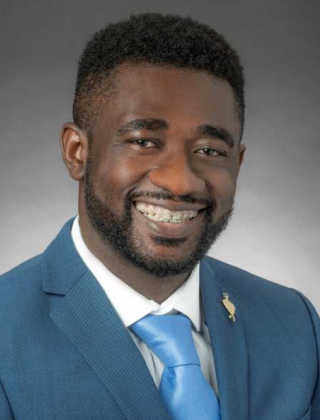I was born in Ghana and grew up there, until I was 15. Then I moved to Ireland, and then to Texas. I got my undergrad degree in pre-medicine in Texas. I moved back to Ireland for medical school, and then to Pennsylvania for my residency at Allegheny General Hospital. I’ve been all over, but the first move to Ireland was the biggest culture shock.

Richard Amoateng, MD, Third-Year Internal Medicine Resident, Allegheny General Hospital
Growing up I had to help a lot of sick family members battling different ailments, which led to the demise of some. I saw that the health care system in Ghana could be much better, and that motivated me to go into medicine.
One of the things that attracted me to Allegheny was the TRIUMPHS program. TRIUMPHS stands for Today’s Residents Inspiring those Underrepresented in Medicine: Pipeline for the Health Sciences. High-school students from backgrounds that are underrepresented in medicine (URM) are paired with resident physicians who are also from underrepresented groups. The goal is to provide a relatable role model and mentor, as well as opportunities to shadow and experience health care alongside residents, nurses and other health professionals. We liken the program to “having a doctor in the family” who can help navigate the numerous barriers and pitfalls when pursuing such a career.
We recruit students for the program with the help of Edwina Kinchington, PhD, a teacher leader at SciTech, a local high school. At the beginning of the school year, we visit with the students and pitch the program. Currently, we have 16 active mentor-mentee pairs. We try to match students when they are starting 10th grade with first-year residents who have some shared interests. The mentor-mentee pair continues for the duration of high school and residency, with mentor and mentee graduating at the same time.
The students also have the opportunity to shadow in the hospital and watch surgeries being performed. These activities may seem minor, but they make a big difference when you’re considering applying to pre-medical programs. We also provide each student with a personalized jacket with their name and TRIUMPHS embroidered on it, and a pair of scrubs. You can almost see a switch in the students when they put these on and the prospect of a career in medicine becomes real. The program, conceived by our residency program director, Tas Kapetanos, MD, in 2020, has already seen two graduates accepted to pre-med and early assurance programs.
As a minority growing up without any doctors in my family, I experienced the struggle of not knowing how to navigate the system. To get into medical school, the process really starts way back in high school. As was true for me, underrepresented students often don’t have family members who are doctors, or other people to guide them. Having someone to look toward for guidance and inspiration makes a big difference. I am passionate about TRIUMPHS because I feel that it truly helps students, and if we want our field to represent the patients we serve, we have to start early. I hope that other residency programs will see our success and start similar efforts.
Recently, I spent a month in Guyana for a global health rotation. I was able to work in a medicine ward, cardiac ICU, tuberculosis ward, a malaria clinic and an HIV clinic. Working as a doctor in a resource-limited environment has opened my eyes and forced me to reconsider much about the way we practice in the U.S. It was great to be able to share our knowledge and also learn from the doctors there. I’m glad that our residency program, under the leadership of Tom Robertson, MD, offers this opportunity.
While in Guyana, I participated in a virtual “second-look” event for prospective URM residents, where they meet current URM residents and leaders at AHN. The event gives applicants a chance to ask questions about things that are important when considering where to spend the next three or more years of their lives, many of which don’t come out in a typical residency interview. This year, I and one of my co-residents, Amina Hamza, DO, called in to the meeting from our global health rotation. We were proud to show current applicants that not only can you survive as a resident at Allegheny, but you can also have an impact on communities near and far.
Being a resident at Allegheny and part of TRIUMPHS these past three years has been extremely impactful for me. Not only are diversity and inclusive recruitment a priority here, but there is also an investment in my success, and a genuine concern for the pipeline of applicants coming after me.I am also proud to have opportunities to go into communities of color around Pittsburgh to provide care. I have participated in health fairs where we offer health information and basic screenings, and I was involved in COVID-19 education and vaccine drives. AHN is doing so many different activities to reach underserved communities in Pittsburgh.